Ruijie Zheng
EgoScale: Scaling Dexterous Manipulation with Diverse Egocentric Human Data
Feb 18, 2026Abstract:Human behavior is among the most scalable sources of data for learning physical intelligence, yet how to effectively leverage it for dexterous manipulation remains unclear. While prior work demonstrates human to robot transfer in constrained settings, it is unclear whether large scale human data can support fine grained, high degree of freedom dexterous manipulation. We present EgoScale, a human to dexterous manipulation transfer framework built on large scale egocentric human data. We train a Vision Language Action (VLA) model on over 20,854 hours of action labeled egocentric human video, more than 20 times larger than prior efforts, and uncover a log linear scaling law between human data scale and validation loss. This validation loss strongly correlates with downstream real robot performance, establishing large scale human data as a predictable supervision source. Beyond scale, we introduce a simple two stage transfer recipe: large scale human pretraining followed by lightweight aligned human robot mid training. This enables strong long horizon dexterous manipulation and one shot task adaptation with minimal robot supervision. Our final policy improves average success rate by 54% over a no pretraining baseline using a 22 DoF dexterous robotic hand, and transfers effectively to robots with lower DoF hands, indicating that large scale human motion provides a reusable, embodiment agnostic motor prior.
World Action Models are Zero-shot Policies
Feb 17, 2026Abstract:State-of-the-art Vision-Language-Action (VLA) models excel at semantic generalization but struggle to generalize to unseen physical motions in novel environments. We introduce DreamZero, a World Action Model (WAM) built upon a pretrained video diffusion backbone. Unlike VLAs, WAMs learn physical dynamics by predicting future world states and actions, using video as a dense representation of how the world evolves. By jointly modeling video and action, DreamZero learns diverse skills effectively from heterogeneous robot data without relying on repetitive demonstrations. This results in over 2x improvement in generalization to new tasks and environments compared to state-of-the-art VLAs in real robot experiments. Crucially, through model and system optimizations, we enable a 14B autoregressive video diffusion model to perform real-time closed-loop control at 7Hz. Finally, we demonstrate two forms of cross-embodiment transfer: video-only demonstrations from other robots or humans yield a relative improvement of over 42% on unseen task performance with just 10-20 minutes of data. More surprisingly, DreamZero enables few-shot embodiment adaptation, transferring to a new embodiment with only 30 minutes of play data while retaining zero-shot generalization.
DreamDojo: A Generalist Robot World Model from Large-Scale Human Videos
Feb 06, 2026Abstract:Being able to simulate the outcomes of actions in varied environments will revolutionize the development of generalist agents at scale. However, modeling these world dynamics, especially for dexterous robotics tasks, poses significant challenges due to limited data coverage and scarce action labels. As an endeavor towards this end, we introduce DreamDojo, a foundation world model that learns diverse interactions and dexterous controls from 44k hours of egocentric human videos. Our data mixture represents the largest video dataset to date for world model pretraining, spanning a wide range of daily scenarios with diverse objects and skills. To address the scarcity of action labels, we introduce continuous latent actions as unified proxy actions, enhancing interaction knowledge transfer from unlabeled videos. After post-training on small-scale target robot data, DreamDojo demonstrates a strong understanding of physics and precise action controllability. We also devise a distillation pipeline that accelerates DreamDojo to a real-time speed of 10.81 FPS and further improves context consistency. Our work enables several important applications based on generative world models, including live teleoperation, policy evaluation, and model-based planning. Systematic evaluation on multiple challenging out-of-distribution (OOD) benchmarks verifies the significance of our method for simulating open-world, contact-rich tasks, paving the way for general-purpose robot world models.
A Forget-and-Grow Strategy for Deep Reinforcement Learning Scaling in Continuous Control
Jul 03, 2025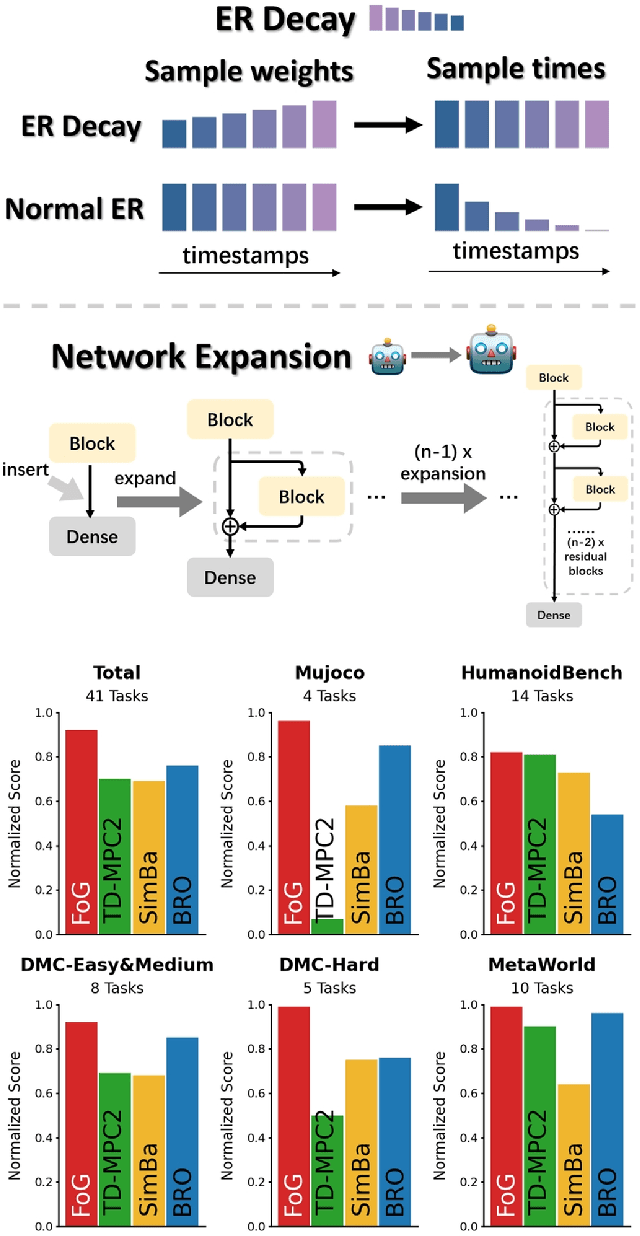
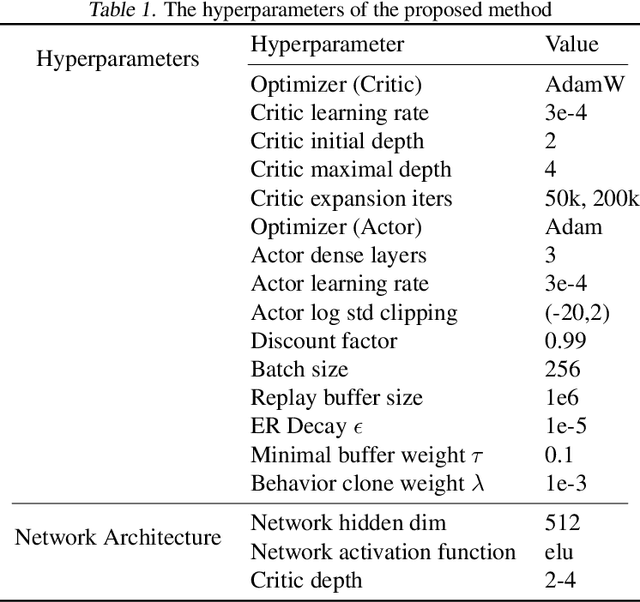
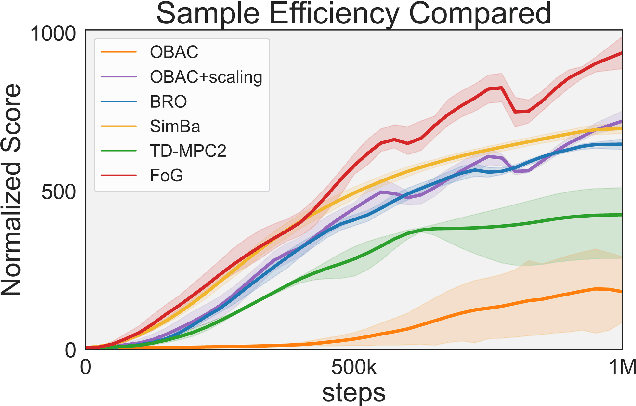
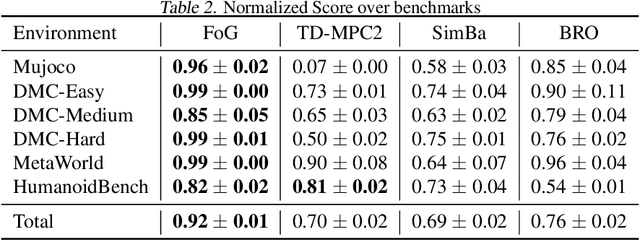
Abstract:Deep reinforcement learning for continuous control has recently achieved impressive progress. However, existing methods often suffer from primacy bias, a tendency to overfit early experiences stored in the replay buffer, which limits an RL agent's sample efficiency and generalizability. In contrast, humans are less susceptible to such bias, partly due to infantile amnesia, where the formation of new neurons disrupts early memory traces, leading to the forgetting of initial experiences. Inspired by this dual processes of forgetting and growing in neuroscience, in this paper, we propose Forget and Grow (FoG), a new deep RL algorithm with two mechanisms introduced. First, Experience Replay Decay (ER Decay) "forgetting early experience", which balances memory by gradually reducing the influence of early experiences. Second, Network Expansion, "growing neural capacity", which enhances agents' capability to exploit the patterns of existing data by dynamically adding new parameters during training. Empirical results on four major continuous control benchmarks with more than 40 tasks demonstrate the superior performance of FoG against SoTA existing deep RL algorithms, including BRO, SimBa, and TD-MPC2.
Provably Learning from Language Feedback
Jun 12, 2025Abstract:Interactively learning from observation and language feedback is an increasingly studied area driven by the emergence of large language model (LLM) agents. While impressive empirical demonstrations have been shown, so far a principled framing of these decision problems remains lacking. In this paper, we formalize the Learning from Language Feedback (LLF) problem, assert sufficient assumptions to enable learning despite latent rewards, and introduce $\textit{transfer eluder dimension}$ as a complexity measure to characterize the hardness of LLF problems. We show that transfer eluder dimension captures the intuition that information in the feedback changes the learning complexity of the LLF problem. We demonstrate cases where learning from rich language feedback can be exponentially faster than learning from reward. We develop a no-regret algorithm, called $\texttt{HELiX}$, that provably solves LLF problems through sequential interactions, with performance guarantees that scale with the transfer eluder dimension of the problem. Across several empirical domains, we show that $\texttt{HELiX}$ performs well even when repeatedly prompting LLMs does not work reliably. Our contributions mark a first step towards designing principled interactive learning algorithms from generic language feedback.
FLARE: Robot Learning with Implicit World Modeling
May 21, 2025Abstract:We introduce $\textbf{F}$uture $\textbf{LA}$tent $\textbf{RE}$presentation Alignment ($\textbf{FLARE}$), a novel framework that integrates predictive latent world modeling into robot policy learning. By aligning features from a diffusion transformer with latent embeddings of future observations, $\textbf{FLARE}$ enables a diffusion transformer policy to anticipate latent representations of future observations, allowing it to reason about long-term consequences while generating actions. Remarkably lightweight, $\textbf{FLARE}$ requires only minimal architectural modifications -- adding a few tokens to standard vision-language-action (VLA) models -- yet delivers substantial performance gains. Across two challenging multitask simulation imitation learning benchmarks spanning single-arm and humanoid tabletop manipulation, $\textbf{FLARE}$ achieves state-of-the-art performance, outperforming prior policy learning baselines by up to 26%. Moreover, $\textbf{FLARE}$ unlocks the ability to co-train with human egocentric video demonstrations without action labels, significantly boosting policy generalization to a novel object with unseen geometry with as few as a single robot demonstration. Our results establish $\textbf{FLARE}$ as a general and scalable approach for combining implicit world modeling with high-frequency robotic control.
DreamGen: Unlocking Generalization in Robot Learning through Neural Trajectories
May 19, 2025Abstract:We introduce DreamGen, a simple yet highly effective 4-stage pipeline for training robot policies that generalize across behaviors and environments through neural trajectories - synthetic robot data generated from video world models. DreamGen leverages state-of-the-art image-to-video generative models, adapting them to the target robot embodiment to produce photorealistic synthetic videos of familiar or novel tasks in diverse environments. Since these models generate only videos, we recover pseudo-action sequences using either a latent action model or an inverse-dynamics model (IDM). Despite its simplicity, DreamGen unlocks strong behavior and environment generalization: a humanoid robot can perform 22 new behaviors in both seen and unseen environments, while requiring teleoperation data from only a single pick-and-place task in one environment. To evaluate the pipeline systematically, we introduce DreamGen Bench, a video generation benchmark that shows a strong correlation between benchmark performance and downstream policy success. Our work establishes a promising new axis for scaling robot learning well beyond manual data collection.
TREND: Tri-teaching for Robust Preference-based Reinforcement Learning with Demonstrations
May 09, 2025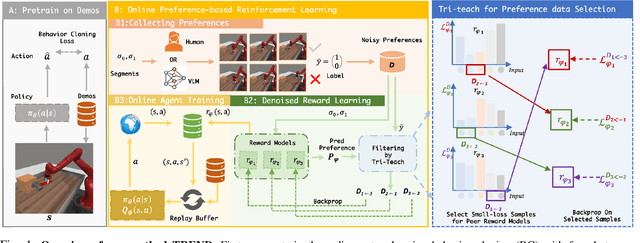
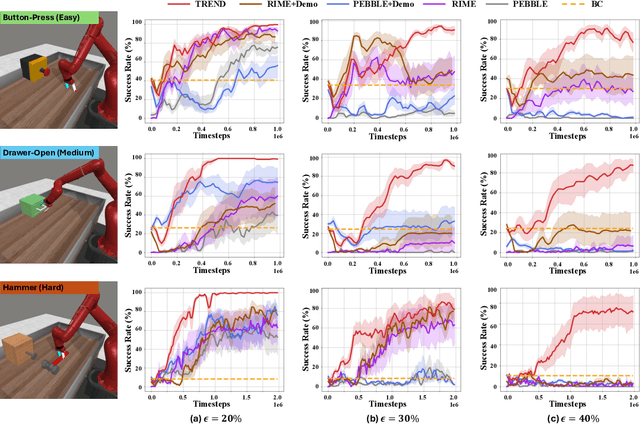
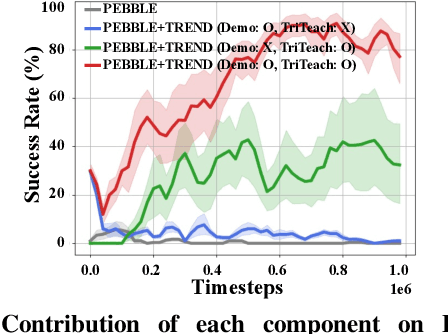
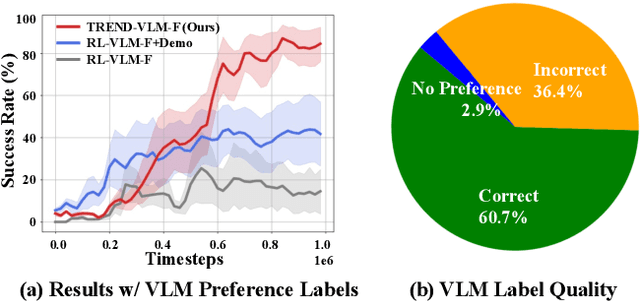
Abstract:Preference feedback collected by human or VLM annotators is often noisy, presenting a significant challenge for preference-based reinforcement learning that relies on accurate preference labels. To address this challenge, we propose TREND, a novel framework that integrates few-shot expert demonstrations with a tri-teaching strategy for effective noise mitigation. Our method trains three reward models simultaneously, where each model views its small-loss preference pairs as useful knowledge and teaches such useful pairs to its peer network for updating the parameters. Remarkably, our approach requires as few as one to three expert demonstrations to achieve high performance. We evaluate TREND on various robotic manipulation tasks, achieving up to 90% success rates even with noise levels as high as 40%, highlighting its effective robustness in handling noisy preference feedback. Project page: https://shuaiyihuang.github.io/publications/TREND.
GR00T N1: An Open Foundation Model for Generalist Humanoid Robots
Mar 18, 2025Abstract:General-purpose robots need a versatile body and an intelligent mind. Recent advancements in humanoid robots have shown great promise as a hardware platform for building generalist autonomy in the human world. A robot foundation model, trained on massive and diverse data sources, is essential for enabling the robots to reason about novel situations, robustly handle real-world variability, and rapidly learn new tasks. To this end, we introduce GR00T N1, an open foundation model for humanoid robots. GR00T N1 is a Vision-Language-Action (VLA) model with a dual-system architecture. The vision-language module (System 2) interprets the environment through vision and language instructions. The subsequent diffusion transformer module (System 1) generates fluid motor actions in real time. Both modules are tightly coupled and jointly trained end-to-end. We train GR00T N1 with a heterogeneous mixture of real-robot trajectories, human videos, and synthetically generated datasets. We show that our generalist robot model GR00T N1 outperforms the state-of-the-art imitation learning baselines on standard simulation benchmarks across multiple robot embodiments. Furthermore, we deploy our model on the Fourier GR-1 humanoid robot for language-conditioned bimanual manipulation tasks, achieving strong performance with high data efficiency.
Magma: A Foundation Model for Multimodal AI Agents
Feb 18, 2025Abstract:We present Magma, a foundation model that serves multimodal AI agentic tasks in both the digital and physical worlds. Magma is a significant extension of vision-language (VL) models in that it not only retains the VL understanding ability (verbal intelligence) of the latter, but is also equipped with the ability to plan and act in the visual-spatial world (spatial-temporal intelligence) and complete agentic tasks ranging from UI navigation to robot manipulation. To endow the agentic capabilities, Magma is pretrained on large amounts of heterogeneous datasets spanning from images, videos to robotics data, where the actionable visual objects (e.g., clickable buttons in GUI) in images are labeled by Set-of-Mark (SoM) for action grounding, and the object movements (e.g., the trace of human hands or robotic arms) in videos are labeled by Trace-of-Mark (ToM) for action planning. Extensive experiments show that SoM and ToM reach great synergy and facilitate the acquisition of spatial-temporal intelligence for our Magma model, which is fundamental to a wide range of tasks as shown in Fig.1. In particular, Magma creates new state-of-the-art results on UI navigation and robotic manipulation tasks, outperforming previous models that are specifically tailored to these tasks. On image and video-related multimodal tasks, Magma also compares favorably to popular large multimodal models that are trained on much larger datasets. We make our model and code public for reproducibility at https://microsoft.github.io/Magma.
 Add to Chrome
Add to Chrome Add to Firefox
Add to Firefox Add to Edge
Add to Edge